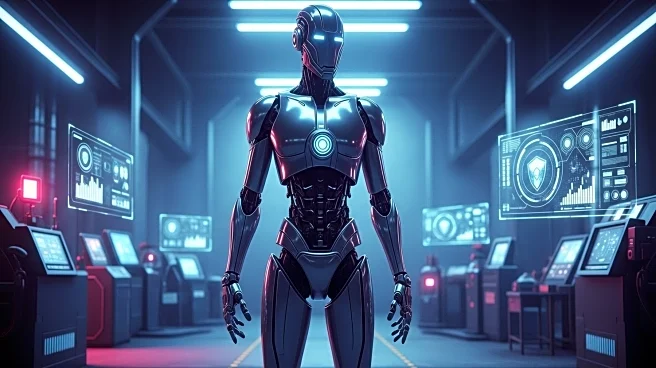What's Happening?
The latest State of Smart Manufacturing Report from Rockwell Automation Inc. highlights a significant shift in the manufacturing sector's approach to cybersecurity. Cyber risks have emerged as a top business issue, second only to economic conditions, and are now considered a major threat to manufacturing growth. The report indicates that manufacturers are increasingly integrating artificial intelligence (AI) and machine learning (ML) to bolster defenses against cyber threats. This trend is driven by the growing interconnectivity of information technology (IT) and operational technology (OT) in smart operations. Key findings reveal that 61% of cybersecurity and IT professionals plan to adopt AI and ML for security within the next year, surpassing general manufacturing adoption rates. Additionally, nearly half of cybersecurity professionals emphasize securing converging IT/OT architecture as crucial for positive outcomes over the next five years.
Why It's Important?
The adoption of AI and ML in cybersecurity is crucial for the manufacturing sector, which faces increasing cyber threats due to the integration of digital and physical infrastructure. As manufacturers strive to protect their operations, AI and ML offer advanced solutions for managing supply chains and improving product quality. This shift not only enhances security but also addresses workforce development challenges, as cybersecurity skills become a priority in hiring. The focus on AI-driven quality control further underscores the importance of aligning technical innovation with business strategy, ensuring product safety and sustainability. The report's findings highlight the evolving role of AI in transforming manufacturing processes and safeguarding against cyber risks.
What's Next?
Manufacturers are expected to continue expanding their use of AI and ML in cybersecurity, with a focus on securing IT/OT architecture and improving supply chain management. As AI adoption accelerates, companies will likely invest in workforce development to address the shortage of skilled talent and training challenges. The emphasis on cybersecurity practices and standards as essential skill sets will drive hiring priorities, reinforcing the need for technical innovation aligned with human development. Additionally, the integration of AI in quality control processes will play a key role in enhancing product safety and sustainability, shaping the future of manufacturing operations.
Beyond the Headlines
The increasing reliance on AI and ML in cybersecurity raises ethical and legal considerations, particularly regarding data privacy and the potential for AI-driven decision-making. As manufacturers adopt these technologies, they must navigate the complexities of ensuring data protection while leveraging AI's capabilities. The convergence of IT and OT architecture also presents cultural challenges, as organizations must foster collaboration between traditionally separate domains. Long-term, the integration of AI in manufacturing could lead to shifts in industry standards and practices, influencing global competitiveness and innovation.








